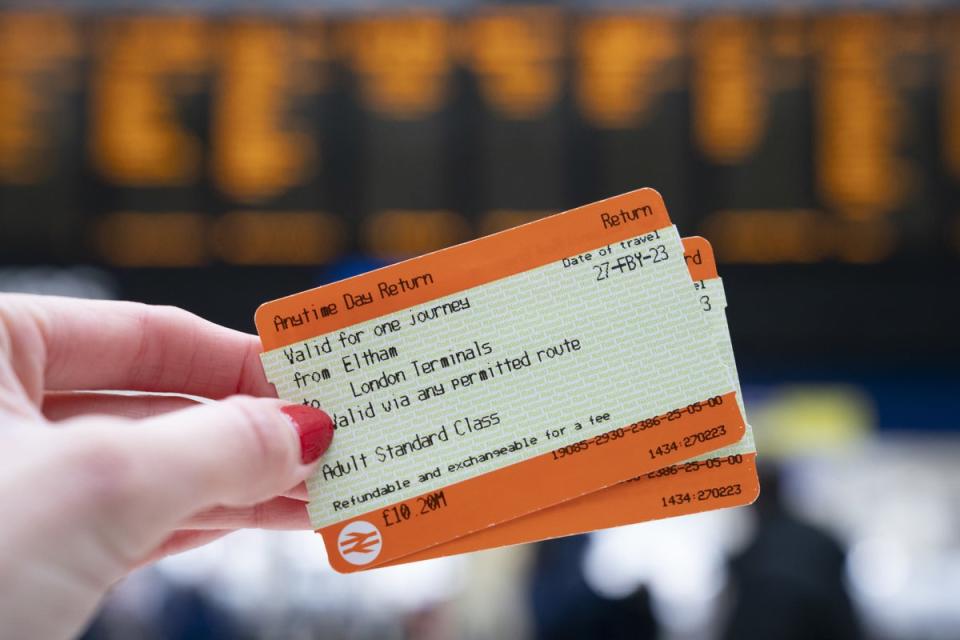Rail passengers in England face ‘brutal’ hike as fares to rise by 4.9% next year
Rishi Sunak[1]'s government has been accused of failing to protect train passengers from "brutal" price hikes, after revealing regulated rail fares[2] in England will rise by nearly 5 per cent in March. The Department for Transport has set a cap of 4.9 per cent for increases to most fares[3], including season tickets, some off-peak return tickets and flexible tickets for travel around major cities. It means prices will rise faster than Consumer Prices Index (CPI) inflation of 3.9 per cent in November - though it is lower that the Retail Prices Index measure of 9 per cent.
Labour[4] called the increase a "brutal bumper rise". Keir Starmer's party said it will mean a 66 per cent spike in rail fares since the Tories came to power in May 2010 - almost twice as fast as wages. Louise Haigh, Labour's shadow transport secretary, said: "It beggars belief that after the worst ever year for cancellations on our railways, the Conservatives would deliver a brutal rail fare hike for millions of long-suffering passengers."
She added: "Household budgets have already been squeezed to their limit by the cost of living crisis, and now passengers are being asked to pay more for a service that is worsening every year." The increase could add GBP190 to an annual season ticket from Woking to London, taking the cost from GBP3,880 to GBP4,070. It could also see flexi season tickets for travel between Liverpool and Manchester on two days per week over a year rising by GBP92.60 from GBP1,890 to GBP1,982.60.


Fares controlled by government will rise at start of March next year (PA Archive)
A spokesman for watchdog London TravelWatch said hard-pressed passengers would be "hit with another unwelcome price hike", adding: "Reform to rail fares and ticketing could not be more urgent now." Transport secretary Mark Harper[5] defended the "significant intervention by the government to cap the increase in rail fares below last year's rise". He said: "Changed working patterns after the pandemic mean that our railways are still losing money and require significant subsidies, so this rise strikes a balance to keep our railways running, while not overburdening passengers."
Story continues Mr Sunak said on Friday that the government has capped the increase of rail fares "at much less than they went up last year". Train operators set unregulated fares, although their decisions are heavily influenced by the government due to contracts introduced because of the Covid pandemic.
Since the railways were privatised in the mid-1990s, regulated fare rises in England were not more than one percentage point above or below RPI until last year. Michael Solomon Williams, from charity Campaign for Better Transport, said the hike "sends the wrong message about how we want and need people to travel ... rail travel needs to be an affordable choice, not a luxury." Left-wing union boss Mick Lynch, general secretary of the RMT, said the government was presiding over "the managed decline of the railways"
He added: "Meanwhile passengers are once again slapped in the face with massive fare increases proving once again what a categorical failure the fragmented privatised system is." The DfT said its actions will keep regulated fares more than 9 per cent lower than they would have been if increases matched RPI in the last two years. The Scottish government announced on Wednesday that all ScotRail fares will rise by 8.7 per cent from 1 April.
No decision has been made on fare rises in Wales.
References
- ^ Rishi Sunak (www.independent.co.uk)
- ^ rail fares (www.independent.co.uk)
- ^ for increases to most fares (uk.news.yahoo.com)
- ^ Labour (www.independent.co.uk)
- ^ Mark Harper (www.independent.co.uk)